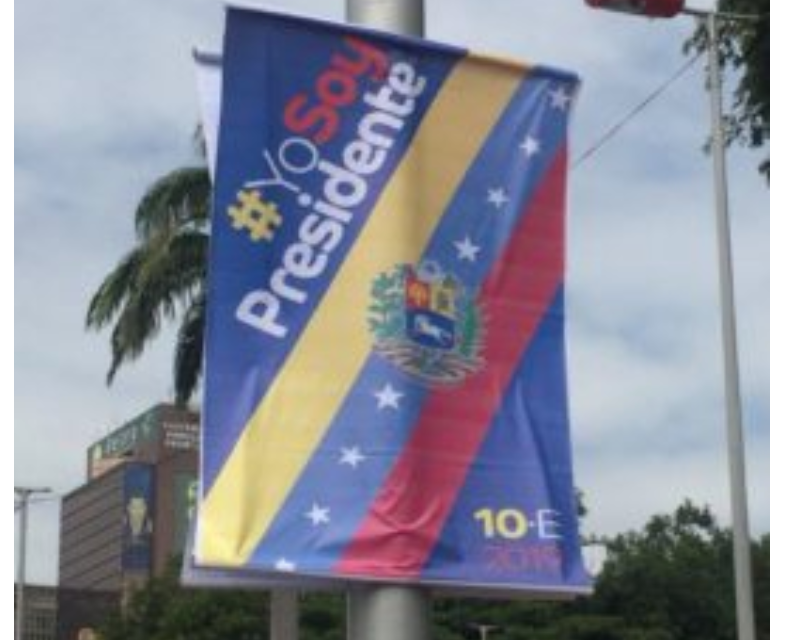Major streets and highways of Caracas have been decorated with banners declaring #YoSoyPresidente (#IAmPresident) 10E (10th of January) effectively expressing both Nicolás Maduro’s intentions to be sworn in for a second presidential term, despite broad rejection of the May 20, 2018 presidential elections in Venezuela and abroad, as well as the government’s clear concerns about his legitimacy being questioned.
The most likely space for confrontation is between the National Assembly (AN)—democratically elected in 2015 and controlled by the opposition—and the National Constituent Assembly (ANC)—unconstitutionally elected and constituted in 2017. The National Assembly held its first session of the year on January 5, naming a new president, Juan Guaidó. In his acceptance speech after being named president of the AN Guaidó emphasized that Nicolás Maduro would be usurping power if he was sworn in on the 10th. He also said they would be naming a “transition commission” to lead the return to democracy.
In his speach, Guaidó directly reached out to the military asking for their support to push for an end of the “usurpation.” Guaidó openly criticized the #YoSoyPresidente banners placed around Caracas and said nobody should believe the show. “You’re illegimate and will not be recognized by the @AsambleaVE, nor by the international community, much less by the Venezuelan people. #MaduroUsurpador.”
Outreach to the military is especially sensitive, given reports that Minister of Defense Vladimir Padrino López had asked Maduro to resign in December.
Government forces are not sitting on the sidelines. President of the National Constituent Assembly, Diosdado Cabello has threatened that the ANC could take measures “to cure” the National Assembly if they “continue with their attitude.” Conceived as a supra-constitutional body, the ANC sees itself as having the power to dissolve the AN if need be.
For his part, Maduro named Gustavo Gonzalez López as the chief of his new presidential security unit. González López was head of the National Bolivarian Intelligence Service (SEBIN) until October when Maduro removed him as part of the fallout over the death of councilman Fernando Albán while in custody of the SEBIN. He is among the Maduro government officials sanctioned by the U.S. government.
And progovernment collectives have been circulating the streets of downtown Caracas in a show of force, declaring they will “defend the Fatherland from imperialism and its lackeys.”
The international context of the confrontation was provided last week by an unexpectedly strong statement from the Lima Group, an ad hoc group of twelve countries in the region that have been organizing to opposed Venezuela’s democratic slide since 2017. The Lima Group declaration suggested that Nicolás Maduro should not be sworn in and should call new presidential elections. The governments also suggested they could individually adopt sanctions on Maduro government officials.
Clearly taken aback, In a televised press conference on January 9, Maduro warned that he would take “diplomatic measures” against the nations that signed the Lima Group statement unless they walk back their position that Maduro’s second term would be illegitimate.
More International Context
- Mexico did not sign on to the Lima Group’s statement. It said it was concerned by the human rights situation in Venezuela but would not give an opinion on the legitimacy of the Maduro government since it had followed a legitimate and constitutional process and did not require the approval of foreign governments. President Andrés Manuel López Obrador said “I don’t get involved in other countries’ affairs.”
- The US Treasury sanctioned Venezuelans individuals and business groups who were involved in a multi-billion dollar illicit foreign exchange scheme, including Raúl Gorrín, one of the owners of Globovisión. The latter was itself among the sanctioned, although it is being given a grace period of one year in which Gorrin and his partner are to divest their holdings for it to avoid sanctions.
- A Supreme Court Justice fled to the United States saying he could no longer facilitate the Maduro government, and suggesting he would cooperate with the U.S. government. He was sanctioned by the Canadian government but not the US government.
- US Secretary of State Mike Pompeo met with Brazilian President Jair Bolsonaro and discussed a “joint effort” at supporting democracy in Venezuela, Cuba and Nicaragua.
- Bolsonaro said he would be open to having a US military base in Brazil, given the threat posed by Russian involvement in Venezuela. However, insiders suggest this idea did not go over well inside of the Brazilian military.
- The Washington Office on Latin America has published a policy mem0 suggesting constructive policies for the United States to take with respect to Venezuela. In addition, I published an op ed in The Hill, with Abraham Lowenthal suggesting the key to moving forward in Venezuela is organizing the opposition. It was republished in Clarín of Argentina and Folha de Sao Paulo. I also published a piece in The Conversation showing there is more support in Venezuela for a negotiated settlement than foreign military intervention.
Economy
- Venezuela’s State Oil Company PDVSA made two deals, one with a French company and another with a US firm, for joint ventures to expand oil production. The National Assembly is calling the deals illegal since they were not approved by it.
Human Rights
- Human Rights Watch and Venezuela’s Foro Penal released a report saying military personnel that have been detained for alleged involvement in coup plans have been tortured and their families harassed.
- There is not yet a date for United Nations High Commissioner for Human Rights Michele Bachelet to visit Venezuela, but her office has formally accepted Venezuela’s invitation and has requested that a technical team be allowed to visit with access to all necessary information.
Migration
- Brazil’s Bolsonaro confirmed that his country would be withdrawing from the recently approved United Nations Global Compact for Safe, Orderly and Regular Migration. This could mean trouble for Venezuelan migrants to Brazil who have faced xenophobic attacks in Roraima state and attempts to close the Brazilian border.


